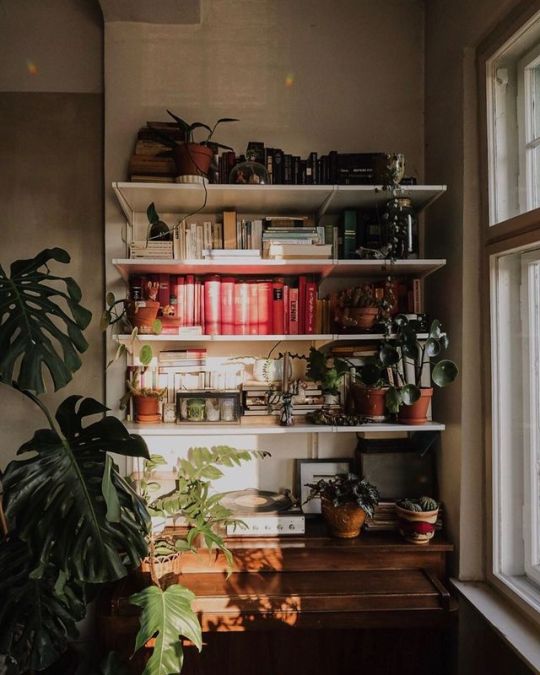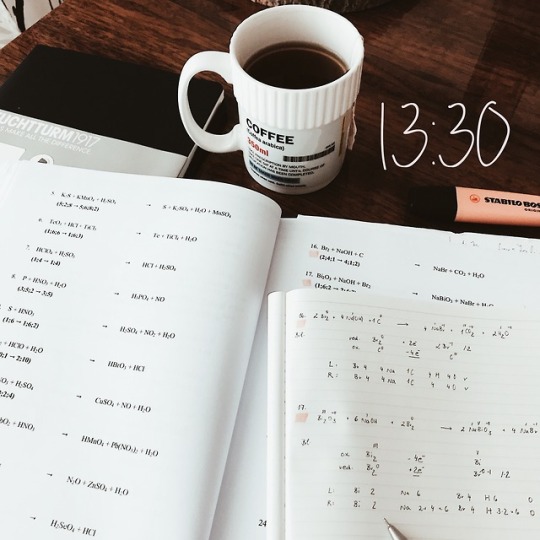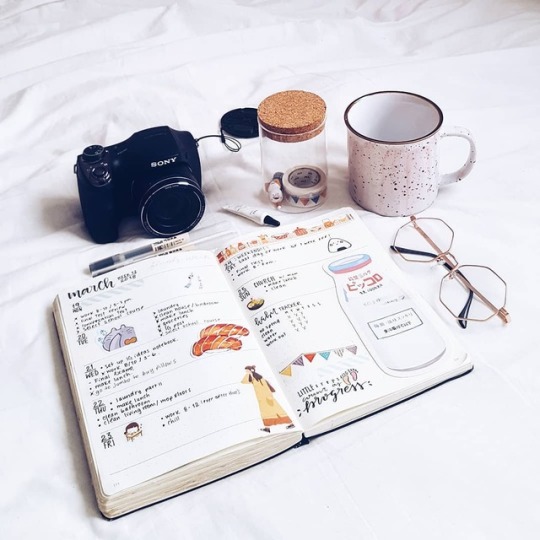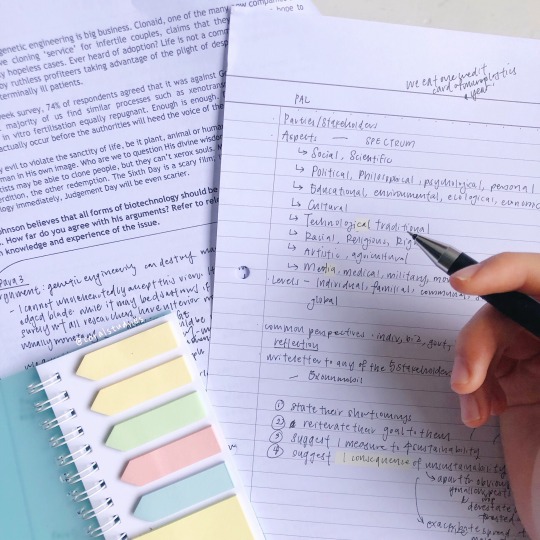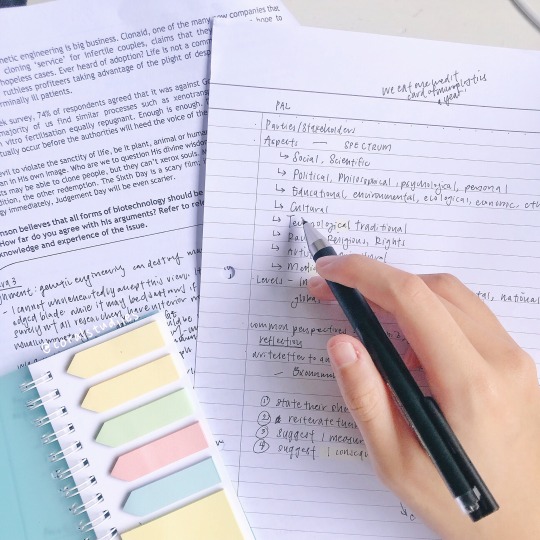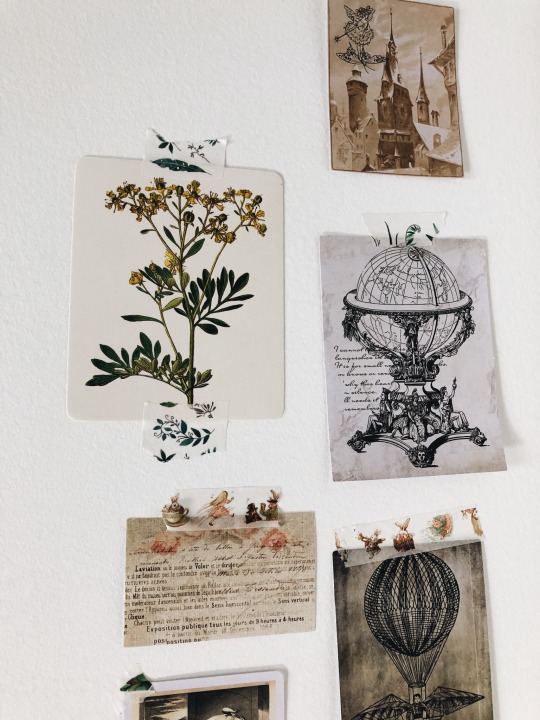Photo

07.04.2019
Sitting in my sunlit appartement, eating breakfast and listening to Beirut. My friends and I were at their concert last night - it was so lovely! I’m still a bit hungover but I’ve got a lot on my to do list. Let’s get this bread!
6K notes
·
View notes
Photo


小御所
鎌倉時代以降建てられるようになった御殿で、江戸時代は武家との対面や儀式の場として用意された。明治維新の際には、将軍に対する処置を定めた「小御所会議」が行われたことでも有名である。上階・中階・下階の3室のまわりに広い板敷(廂)が付き、様々な儀式に対応できる実用的な建物であった。
昭和29 (1954)年に焼失し、昭和33(1958)年に復元された。
Kogosho (used for ceremonies and imperial audiences)
The Kogosho was built during the Kamakura period (1185-1333), and was used in the Edo period (1603-1868) to hold ceremonies and for imperial audiences with members of the governing samurai class (buke). This building is famous as the place where discussions were held on how to deal with the Tokugawa Shogun following the Meiji Restoration in 1868. The building is divided into three rooms each higher than the next, surrounded by a wide wooden corridor, making the Kogosho a very practical building capable of accomodating many different ceremonies. The current Kogosho was rebuilt in 1958 after it burnt down in 1954.
Vocab
鎌倉時代(かまくらじだい)Kamakura Period (1185-1333 CE)
武家(ぶけ)samurai, warrior, military family
将軍(しょうぐん)shogun, general
処置(しょち)measure, step, dealing with
定める(さだめる)to determine, decide
小御所会議(こごしょかいぎ)Kogosho Conference [1/3/1868]
上階(じょうがい)floor above, floor upstairs
下階(かかい)floor below, floor downstairs
板敷(いたじき)wooden floor
廂(ひさし)narrow aisle surrounding the core of a temple building
実用的(じつようてき)practical, useful
焼失(しょうしつ)destruction by fire, being burnt down
25 notes
·
View notes
Text
Languages 101: a language learning guide by a polyglot

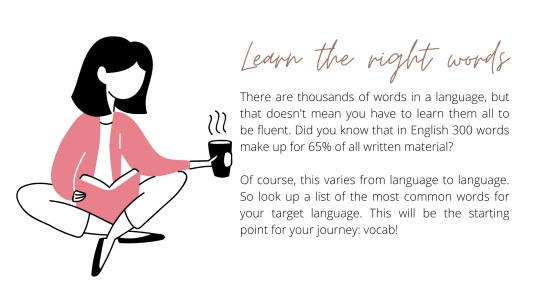
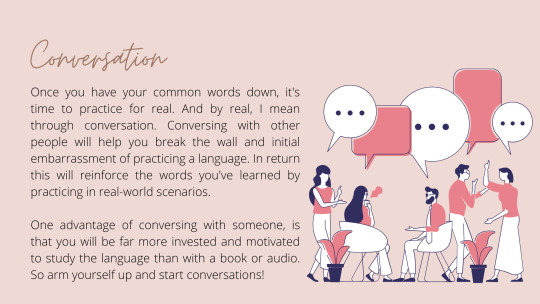
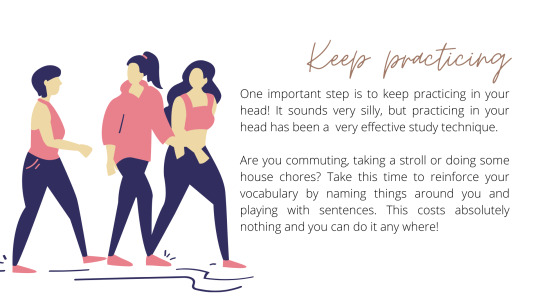
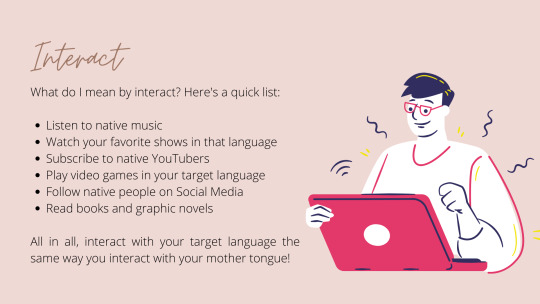

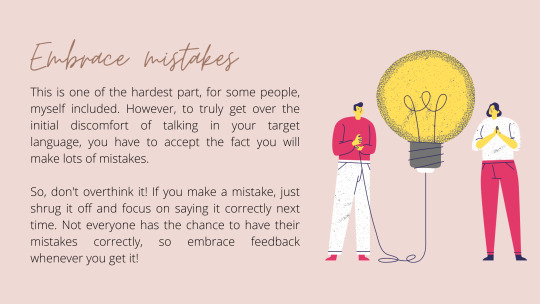
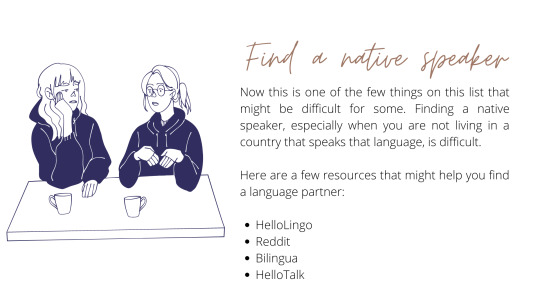
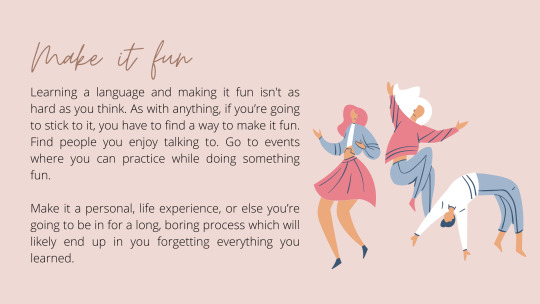

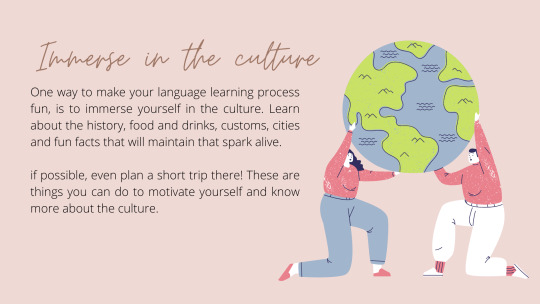
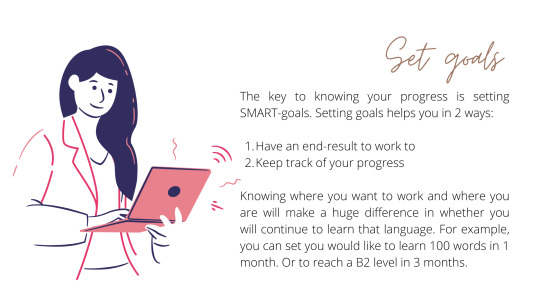
Hey, guys. Lala here! As polyglot who speaks 5 languages and learning more, I’ve been through my fair share of language learning experiences. Here, I wanted to share some tips with you guys that have helped me along my journey.
What are some language learning tips that have helped you guys? Share them with me! Do you have a question? Don’t be afraid to leave me an ask!
Read more of my content here:
5 tips on how to be productive when studying from home
My study routine for ultimate productivity
Minimalist student toolkit
Written by @lalavscollege
3K notes
·
View notes
Photo

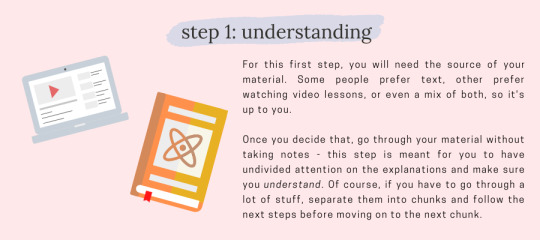

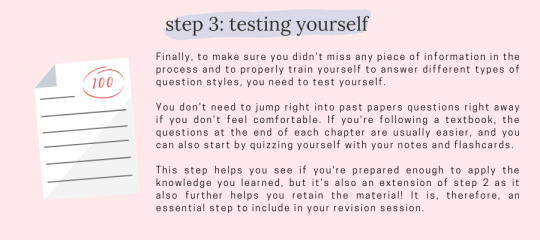
now that most of us are at home, i thought this infographic could be useful to the ones who aren't that used to learning material on their own and aren’t sure where to start, or which order of steps to follow. happy studying! 💗
studygram
14K notes
·
View notes
Text
How to learn a language when you don’t know where to start:
General Plan:
Weeks 1 and 2:
Purpose:
Learn the fundamentals sentence construction
Learn how to spell and count
Start building a phrase stockpile with basic greetings
The Alphabet
Numbers 1 - 100
Subject Pronouns
Common Greetings
Conjugate the Two Most Important Verbs: to be and to have
Basic Definite and Indefinite Articles
Weeks 3 and 4:
Purpose:
Learn essential vocabulary for the day-to-day
Start conjugating regular verbs
Days of the Week and Months of the Year
How to tell the time
How to talk about the weather
Family Vocabulary
Present Tense Conjugations Verbs
Weeks 5 and 6:
Purpose:
Warm up with the last of the day-to-day vocabulary
Add more complex types of sentences to your grammar
Colours
House vocabulary
How to ask questions
Present Tense Conjugations Verbs
Forming negatives
Weeks 7 and 8:
Purpose:
Learn how to navigate basic situations in a region of your target language country
Finish memorising regular conjugation rules
Food Vocabulary and Ordering at Restaurants
Money and Shopping Phrases
Present Tense Conjugations Verbs
Weeks 9 and 10:
Purpose:
Start constructing descriptive and more complex sentences
Adjectives
Reflective verbs
Places vocabulary
Weeks 11 and 12:
Purpose:
Add more complex descriptions to your sentences with adverbs
Wrap up vocabulary essentials
Adverbs
Parts of the body and medical vocabulary
Tips for Learning a Foreign Language:
Learning Vocabulary:
What vocabulary should I be learning?
There are hundreds of thousands of words in every language, and the large majority of them won’t be immediately relevant to you when you’re starting out.Typically, the most frequent 3000 words make up 90% of the language that a native speaker uses on any given day. Instead try to learn the most useful words in a language, and then expand outwards from there according to your needs and interests.
Choose the words you want/need to learn.
Relate them to what you already know.
Review them until they’ve reached your long-term memory.
Record them so learning is never lost.
Use them in meaningful human conversation and communication.
How should I record the vocabulary?
Learners need to see and/or hear a new word of phrase 6 to 17 times before they really know a piece of vocabulary.
Keep a careful record of new vocabulary.
Record the vocabulary in a way that is helpful to you and will ensure that you will practice the vocabulary, e.g. flashcards.
Vocabulary should be organised so that words are easier to find, e.g. alphabetically or according to topic.
Ideally when noting vocabulary you should write down not only the meaning, but the grammatical class, and example in a sentence, and where needed information about structure.
How should I practice using the vocabulary?
Look, Say, Cover, Write and Check - Use this method for learning and remembering vocabulary. This method is really good for learning spellings.
Make flashcards. Write the vocabulary on the front with the definition and examples on the back.
Draw mind maps or make visual representations of the new vocabulary groups.
Stick labels or post it notes on corresponding objects, e.g when learning kitchen vocabulary you could label items in your house.
How often should I be practising vocabulary?
A valuable technique is ‘the principle of expanding rehearsal’. This means reviewing vocabulary shortly after first learning them then at increasingly longer intervals.
Ideally, words should be reviewed:
5-10 minutes later
24 hours later
One week later
1-2 months later
6 months later
Knowing a vocabulary item well enough to use it productively means knowing:
Its written and spoken forms (spelling and pronunciation).
Its grammatical category and other grammatical information
Related words and word families, e.g. adjective, adverb, verb, noun.
Common collocations (Words that often come before or after it).
Receptive Skills: Listening and Reading
Reading is probably one of the most effective ways of building vocabulary knowledge.
Listening is also important because it occupies a big chunk of the time we spend communicating.
Tips for reading in a foreign language:
Start basic and small. Children’s books are great practice for beginners. Don’t try to dive into a novel or newspaper too early, since it can be discouraging and time consuming if you have to look up every other word.
Read things you’ve already read in your native language. The fact that you at least know the gist of the story will help you to pick up context clues, learn new vocabulary and grammatical constructions.
Read books with their accompanying audio books. Reading a book while listening to the accompanying audio will improve your “ear training”. It will also help you to learn the pronunciation of words.
Tips for listening in a foreign language:
Watch films in your target language.
Read a book while also listening along to the audio book version.
Listen to the radio in your target language.
Watch videos online in your target language.
Activities to do to show that you’ve understood what you’ve been listening to:
Try drawing a picture of what was said.
Ask yourself some questions about it and try to answer them.
Provide a summary of what was said.
Suggest what might come next in the “story.”
Translate what was said into another language.
“Talk back” to the speaker to engage in imaginary conversation.
Productive Skills: Speaking and Writing
Tips for speaking in a foreign language:
If you can, try to speak the language every day either out loud to yourself or chat to another native speaker whether it is a colleague, a friend, a tutor or a language exchange partner.
Write a list of topics and think about what you could say about each one. First you could write out your thoughts and then read them out loud. Look up the words you don’t know. You could also come up with questions at the end to ask someone else.
A really good way to improve your own speaking is to listen to how native speakers talk and imitate their accent, their rhythm of speech and tone of voice. Watch how their lips move and pay attention to the stressed sounds. You could watch interviews on YouTube or online news websites and pause every so often to copy what you have just heard. You could even sing along to songs sung in the target language.
Walk around the house and describe what you say. Say what you like or dislike about the room or the furniture or the decor. Talk about what you want to change.This gets you to practise every day vocabulary.
Tips for writing in a foreign language:
Practice writing in your target language. Keep it simple to start with. Beginner vocabulary and grammar concepts are generally very descriptive and concrete.
Practice writing by hand. Here are some things you can write out by hand:
Diary entries
Shopping lists
Reminders
What could I write about?
Write about your day, an interesting event, how you’re feeling, or what you’re thinking.
Make up a conversation between two people.
Write a letter to a friend, yourself, or a celebrity. You don’t need to send it; just writing it will be helpful.
Translate a text you’ve written in your native language into your foreign language.
Write a review or a book you’ve recently read or a film you’ve recently watched.
Write Facebook statuses, Tweets or Tumblr posts (whether you post them or not will be up to you).
Write a short story or poem.
Writing is one of the hardest things to do well as a non-native speaker of a language, because there’s no room to hide.
There are lots of ways to improve your writing ability, but they can be essentially boiled down to three key components:
Read a lot
Write a lot
Get your writing corrected
28K notes
·
View notes
Photo

“you have to create your own space which has a lot of silence in it and a lot of books.” — susan sontag, from an interview conducted c. october 1979
5K notes
·
View notes
Text
domestic sweetness!!!! getting groceries together, buying home decor together??? making traditions??? cooking dinner while badly singing along to the radio??? making each other breakfast in bed??? leaving notes around the house for each other??? i’m so soft,,,,
204K notes
·
View notes
Text
Staying Focused: Tips for Maintaining Focus while Studying

You’ve sat down at your desk. You have everything you need on your table or somewhere around you. You start to work. You think, “this is going well,” until a notification pops up on your laptop screen. And then another notification pops up on your phone. And during that period when your eyes were off of your study material, you also noticed a bag of chips, a magazine, your unfinished journal spread, your roommate bobbing their leg up and down and up and down, the pattern of the wood on your bookshelf, a text message, your bed … suddenly you can’t remember what you were supposed to be doing but instead think about how much you want to sleep. Or how hungry you are. Or how much you want to go hang out with your friends. Or your entire life choices.
I’m sure we’ve all been there. Sometimes it’s really difficult to stay focused while studying, and with all the distractions that surround us, it really isn’t surprising. However, there are ways that you can minimize the chances that you’ll give in to those distractions and focus on your work instead. Here are some that have worked for me:
Prepare for the session
The first thing you should do is clear your space. Don’t have things lying around that could make you distracted - put all your food where you can’t see them, your phone inside your bag, etc. However, there also comes a time when you have a thought that’s super important, but you can’t extend that thought or you’ll get sucked into a chain of other distracting thoughts. I like to have a notebook or piece of paper nearby where I can jot down these compulsive thoughts that I’ll get back to later - this is usually my bullet journal.
You could also find a study space where you’re the least prone to distraction. For me it’d be a cafe, since I would only have the things I brought with me. My dorm is where a lot of the distractions are: my books, all my journals and stationery, and my bed. Some people like studying in the library, but personally I find it distracting when other people around me are studying as well (especially when it’s super quiet and you can hear every pen click and page turn).
In addition, you might also want to do things like have a snack, go to the bathroom, and check your phone before you start your study session, so you won’t have the urge to do those things during your study session.
Block out your time and assign specific tasks
I’ve found that whenever I have a very vague schedule - like “I’ll study [ subject ] from 3 to 5 or something” or “I’ll complete these 5 tasks in 4 hours” or even worse “I’ll learn the whole syllabus in the next 2 months” - I don’t get as much done as I could. It’s hard to focus when you don’t really have a specific thing to focus on. You know how on the weekends especially, you have a whole list of things to do but every time you do one thing you get distracted by the thought of another? That can be solved by time blocking. Set aside a specific period of time to do a specific task, and eventually, those will accumulate into more productive hours.
It’s even more efficient to block smaller periods of time - 5 or 10 minutes or so. For example, even though I use the pomodoro technique of doing a task for 25 minutes then taking a 5-minute break, I break up those 25 minutes. If I were studying my flashcards, I might set a goal of finishing one stack - usually one topic - in 10 minutes (depending on the thickness of the stack). If I simply assigned 4 pomodoro sessions to review all my cards, this would make me prone to stretching out the amount of time I spend on a single stack, and in that stretching of time comes a loss of focus. It is a lot easier to focus for 10 minutes on one thing than 25 minutes on 3 things.
Note: What has helped me study for exams is scheduling out my time in months, and then weeks, then days, then hours, then minutes, so I’ll know the direction I’m going in, but I also won’t be overwhelmed by the amount of tasks I have to complete since I can do one small task at a time.
Practice, practice, practice
Like everything else in life, in order to be good at something, you have to practice. Learning to maintain focus is the same. At first, focusing for 25 minutes might feel hard and maybe even painful, but as you complete more pomodoro sessions, you’ll find that focusing for 25 minutes is effortless (or whatever period of time you usually work/study for).
Another way to practice focusing is by meditating. Meditating is part of my morning routine, and it’s definitely helped me stay focused in other activities, so you might wanna give that a try.
Work alone
I can tell you that of all the group study sessions I’ve had with my friends, most of them are much less efficient than if I had chosen to work alone. (The exception was when I was stuck with a bug in my code and my friend helped me figure it out.) Friends are very distracting, and even when you promise yourselves you’ll work on assignment or that you’ll only discuss the topic you’re studying, your conversation will inevitably stray from that.
Take breaks
When you’re tired, you’re sure to be distracted, so one way of combating that is to take breaks. It refreshes you so that you have more energy to focus during your next study session.
Aside from that, you should schedule your distractions during your breaks - go to the bathroom, grab a snack, go on your phone, or during longer breaks you can talk to your friends, take a nap, etc - so that you won’t give into those compulsions during your study sessions. Because you’ve already done those distracting things, when you’re studying, you’ll end up thinking something along the lines of, “Oh, I’ve already checked Instagram five minutes ago; my phone can wait,” or “I just had a snack, I can go get another one once I’m finished.”
That’s all the tips I have for you right now about how to maintain focus while studying. I hope this has been helpful, but as usual, if you have any questions, or some of your problems aren’t covered in this post, feel free to reach out to me by dropping an ask or sending me a message. Also, linked below are several of my posts that you mind find helpful. Have an awesome day!
Relevant posts
How to Beat Procrastination
The Mandatory Midday Break
4 Secrets to Efficiency
Getting Stuff Done: How to Deal with Lack of Motivation
5K notes
·
View notes
Photo
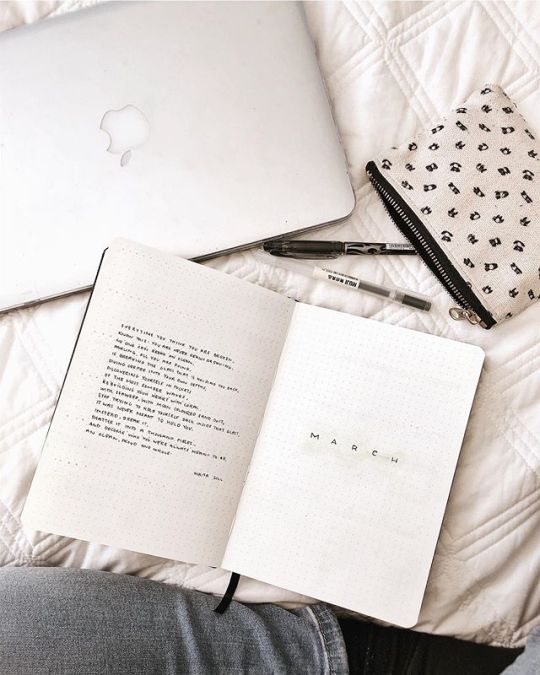
Taking a little breather from all of this madness.
I hope you guys are taking care of yourselves during these weird times!
From my studygram
812 notes
·
View notes
Photo

28.2.2016 // 1%
spend all weekend writing notes for the upcoming test on german history *:・✧*
7K notes
·
View notes
Photo
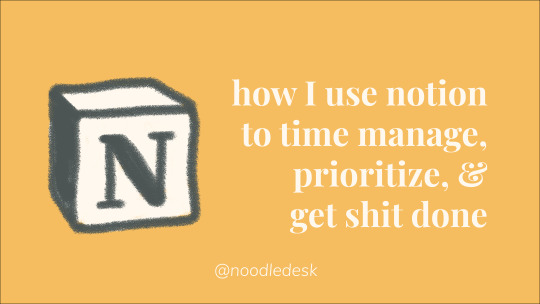

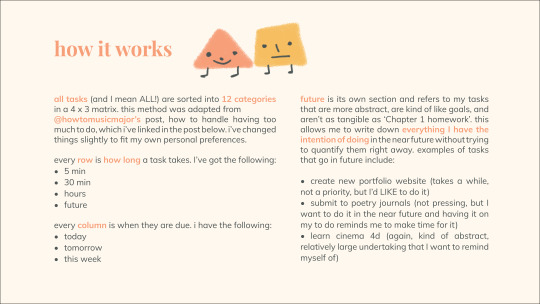
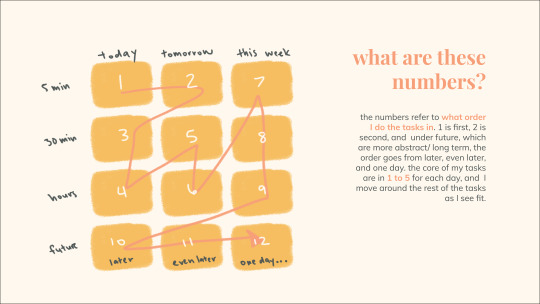
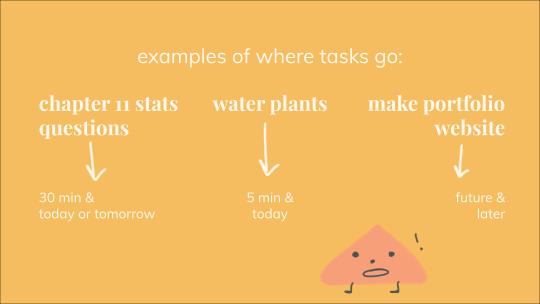
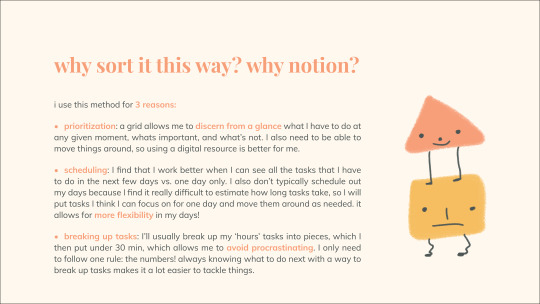



a lot of you have asked how I actually use notion in my day to day life, so I’ve broken down my task manager for all of you! hope this helps :) happy notion-ing! 💖
my other posts on notion: goal setting 📚
edit: i’ve made my template available for everyone to duplicate here! happy notion-ing!
entire post below!
Keep reading
6K notes
·
View notes

